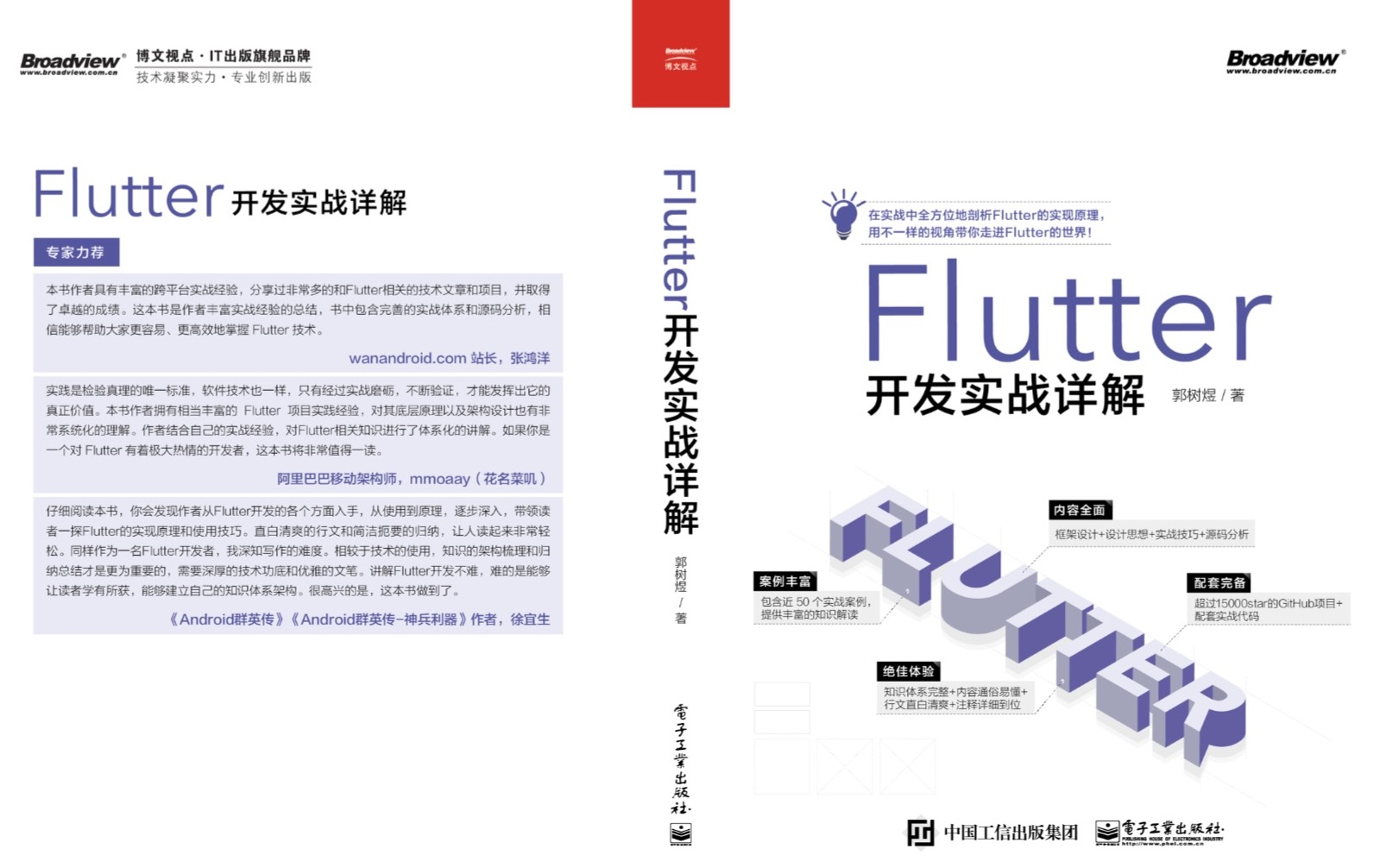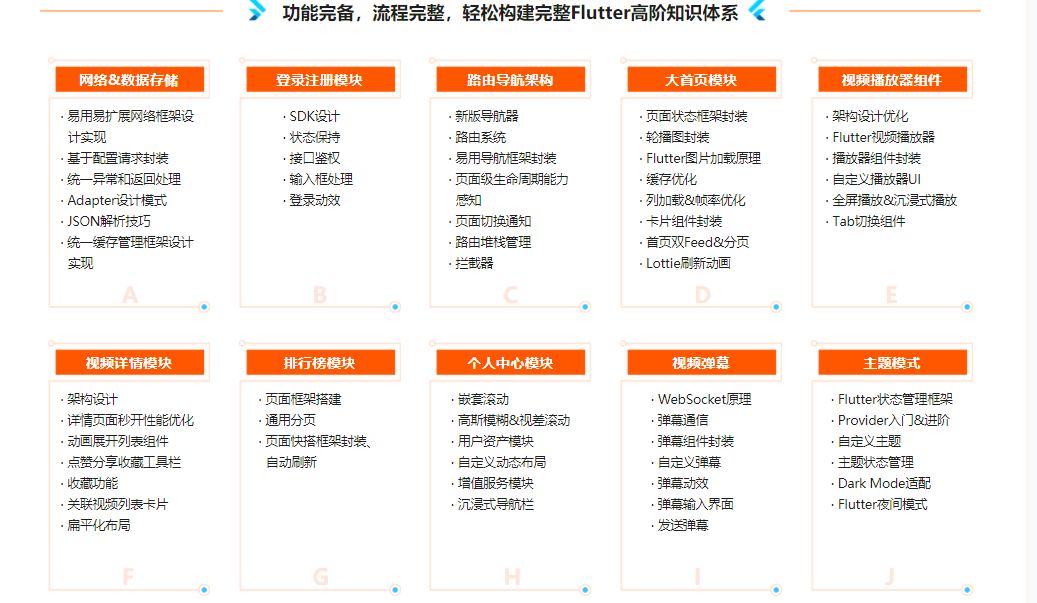Flutter系列文章-Flutter進階
在前兩篇文章中,我們已經瞭解了Flutter的基礎知識,包括Flutter的設計理念、框架結構、Widget系統、基礎Widgets以及佈局。在本文中,我們將進一步探討Flutter的高階主題,包括處理使用者互動、建立動畫、存取網路資料等等。為了更好地理解這些概念,我們將通過實際的範例程式碼來詳細講解。

一、處理使用者互動
在移動應用中,使用者互動是非常重要的一部分。Flutter提供了豐富的Widgets來處理使用者的觸控、點選和手勢等互動事件。
1. 手勢識別
Flutter提供了GestureDetector Widget來識別各種手勢,例如點選、長按、雙擊等。下面是一個簡單的範例,演示如何在點選按鈕時改變文字內容:
import 'package:flutter/material.dart';
void main() {
runApp(MyApp());
}
class MyApp extends StatelessWidget {
@override
Widget build(BuildContext context) {
return MaterialApp(
home: TapExample(),
);
}
}
class TapExample extends StatefulWidget {
@override
_TapExampleState createState() => _TapExampleState();
}
class _TapExampleState extends State<TapExample> {
String _text = 'Click the button';
void _handleTap() {
setState(() {
_text = 'Button Clicked';
});
}
@override
Widget build(BuildContext context) {
return GestureDetector(
onTap: _handleTap,
child: Container(
padding: EdgeInsets.all(12),
color: Colors.blue,
child: Text(
_text,
style: TextStyle(
color: Colors.white,
fontSize: 18,
),
),
),
);
}
}
在上述程式碼中,我們使用GestureDetector包裝了一個Container,當用戶點選Container時,_handleTap函數會被呼叫,文字內容會改變為'Button Clicked'。
2. 拖動手勢
Flutter也支援拖動手勢,你可以使用Draggable和DragTarget來實現拖放操作。下面是一個簡單的範例,演示如何將一個小方塊從一個容器拖動到另一個容器:
import 'package:flutter/material.dart';
void main() {
runApp(MyApp());
}
class MyApp extends StatelessWidget {
@override
Widget build(BuildContext context) {
return MaterialApp(
home: DragExample(),
);
}
}
class DragExample extends StatefulWidget {
@override
_DragExampleState createState() => _DragExampleState();
}
class _DragExampleState extends State<DragExample> {
bool _dragging = false;
Offset _position = Offset(0, 0);
void _handleDrag(DragUpdateDetails details) {
setState(() {
_position = _position + details.delta;
});
}
void _handleDragStart() {
setState(() {
_dragging = true;
});
}
void _handleDragEnd() {
setState(() {
_dragging = false;
});
}
@override
Widget build(BuildContext context) {
return Stack(
children: [
Positioned(
left: _position.dx,
top: _position.dy,
child: Draggable(
onDragStarted: _handleDragStart,
onDragEnd: (_) => _handleDragEnd(), // 修改為不帶引數的形式
onDragUpdate: _handleDrag,
child: Container(
width: 100,
height: 100,
color: Colors.blue,
),
feedback: Container(
width: 100,
height: 100,
color: Colors.blue.withOpacity(0.5),
),
childWhenDragging: Container(),
),
),
Center(
child: DragTarget(
onAccept: (value) {
setState(() {
_position = Offset(0, 0);
});
},
builder: (context, candidates, rejected) {
return Container(
width: 200,
height: 200,
color: Colors.grey,
);
},
),
),
],
);
}
}
在上述程式碼中,我們使用Draggable將一個藍色的小方塊包裝起來,並將其拖動到DragTarget中,當拖動結束時,小方塊會返回DragTarget的中心。
二、建立動畫
Flutter提供了強大的動畫支援,你可以使用AnimationController和Tween來建立各種動畫效果。下面是一個簡單的範例,演示如何使用AnimationController和Tween來實現一個顏色漸變動畫:
import 'package:flutter/material.dart';
void main() {
runApp(MyApp());
}
class MyApp extends StatelessWidget {
@override
Widget build(BuildContext context) {
return MaterialApp(
home: ColorTweenExample(),
);
}
}
class ColorTweenExample extends StatefulWidget {
@override
_ColorTweenExampleState createState() => _ColorTweenExampleState();
}
class _ColorTweenExampleState extends State<ColorTweenExample>
with SingleTickerProviderStateMixin {
late AnimationController _controller;
late Animation<Color?> _animation;
@override
void initState() {
super.initState();
_controller = AnimationController(
vsync: this,
duration: Duration(seconds: 2),
);
_animation = ColorTween(begin: Colors.blue, end: Colors.red)
.animate(CurvedAnimation(parent: _controller, curve: Curves.easeInOut));
_controller.repeat(reverse: true);
}
@override
void dispose() {
_controller.dispose();
super.dispose();
}
@override
Widget build(BuildContext context) {
return Scaffold(
appBar: AppBar(
title: Text('ColorTween Example'),
),
body: Center(
child: AnimatedBuilder(
animation: _animation,
builder: (context, child) {
return Container(
width: 200,
height: 200,
color: _animation.value,
);
},
),
),
);
}
}
在上述程式碼中,我們使用AnimationController和ColorTween來建立一個顏色漸變動畫,將藍色的容器逐漸變為紅色。
三、存取網路資料
在現代應用中,存取網路資料是很常見的需求。Flutter提供了http包來處理網路請求。下面是一個簡單的範例,演示如何使用http包來獲取JSON資料並顯示在ListView中:
import 'dart:convert';
import 'package:flutter/material.dart';
import 'package:http/http.dart' as http;
void main() {
runApp(MyApp());
}
class MyApp extends StatelessWidget {
@override
Widget build(BuildContext context) {
return MaterialApp(
home: HttpExample(),
);
}
}
class HttpExample extends StatefulWidget {
@override
_HttpExampleState createState() => _HttpExampleState();
}
class _HttpExampleState extends State<HttpExample> {
List<dynamic> _data = [];
@override
void initState() {
super.initState();
_getData();
}
Future<void> _getData() async {
final response =
await http.get(Uri.parse('https://jsonplaceholder.typicode.com/posts'));
if (response.statusCode == 200) {
setState(() {
_data = json.decode(response.body);
});
}
}
@override
Widget build(BuildContext context) {
return Scaffold(
appBar: AppBar(
title: Text('HTTP Example'),
),
body: ListView.builder(
itemCount: _data.length,
itemBuilder: (context, index) {
return ListTile(
title: Text(_data[index]['title']),
subtitle: Text(_data[index]['body']),
);
},
),
);
}
}
在上述程式碼中,我們使用http包來獲取JSON資料,並將資料解析後顯示在ListView中。
結束語

通過本文的學習,你已經瞭解了Flutter的高階主題,包括處理使用者互動、建立動畫以及存取網路資料等。這些知識將幫助你更深入地掌握Flutter的開發能力,為你的應用新增更多功能和互動體驗。希望本文對你的Flutter學習之旅有所幫助,祝你在Flutter的世界中取得更多成功!